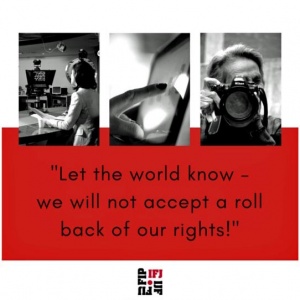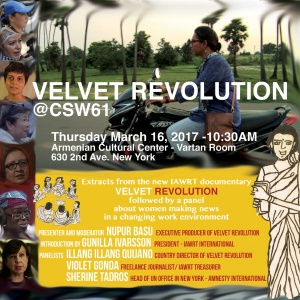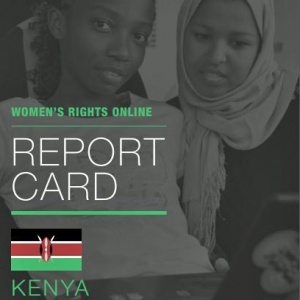“The economic model is not working”
Nonee Walsh
Several thousand Women from around the globe, who are active in women’s issues, have been flooding into New York to learn, network and lobby around the annual meeting of the UN’s Commission on the Status of Women (CSW61) which aims to shape global standards on global progress to equality. This year’s emphasis is on the changing world of work.
However, their work will be “in the face of obstacles caused by the growing nationalism in the world” says Dr Susan O’Malley the Chair of the New York based umbrella group of women’s organisations, NGO/CSW New York. She opened its Consultation day with a call for all women registered to attend the CSW to be allowed to enter the United States. She urged organsiers to make sure that hose denied visas had their voices heard by Skype or phone in parallel events organized by CSW/NY. It was later revealed that three delegates from the international Domestic Workers Federation 1 from Tanzania, and 2 from Nepal were refused entry to the United States.
The Executive Director UN Women Phunzile Mlambo-Nguka also focused on the current global situation “driven apart by inequality, insecurity, conflict violence and a staggering migrant and refugee crisis”. The UN Under Secretary General says economic inequality and a rhetoric of intolerance have a profound impact on the promotion of women’s rights … it is a crucial time to promote economic justice, gender equality and international cooperation.”
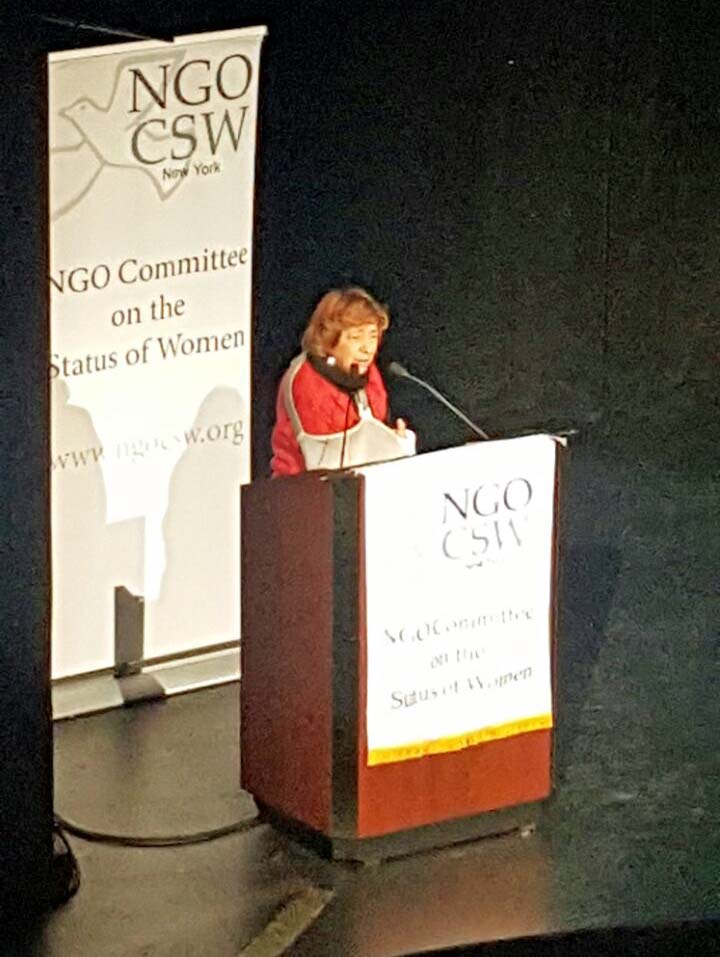 Keynote speaker, Argentinean doctor and women’s activist, Dr Mabel Bianco, the 2017 Woman of Distinction awardee, also had a dire view – she expected the situation to get worse for women’s rights in the next year. “The struggle in Latin America and the Caribbean has had many advances … [but the] political contest worldwide is against human rights and specifically women’s rights”.
Keynote speaker, Argentinean doctor and women’s activist, Dr Mabel Bianco, the 2017 Woman of Distinction awardee, also had a dire view – she expected the situation to get worse for women’s rights in the next year. “The struggle in Latin America and the Caribbean has had many advances … [but the] political contest worldwide is against human rights and specifically women’s rights”.
She is the President of the Foundation for Studies and Research on Women (Fundación para Estudio e Investigación de la Mujer) which is part of her ongoing work in areas such as breast cancer, HIV/AIDS, sexual and reproductive rights and gender-based violence.
Dr Bianco says there have been so many killings of women’s rights defenders that it would fill a book. “We said ‘no more’ after the death of Bertha Casilis”. Ms Casilis was a Honduran indigenous and environmental rights campaigner, killed in 2016 after receiving threats over a campaign against a hydroelectric project. However, she says the 39 girls who perished in a fire at a youth home in Guatemala after they ran away and denounced sexual assaults in the home, must be added to the toll of “women killed for defending their rights.”
For South America, she says the resources rush is one major threat “private interests wanting land to exploit … need to understand their wealth is not threatened if they do not respect women’s and labor rights.” As well, fundamentalists arguing against sexual education are stopping women from exercising choice and preventing the necessary process of society redefining masculinity and femininity.
Dr Bianco says, “the implementation of laws to end violence and discrimination are just a fight for equality and justice.” Antonio de Aguiar Patriota, the Chair of this year’s session of the CSW – made the same point, “the argument against women rights are contradicted “by simply upholding rationalism and humanity.”
Just 8 men own the same wealth as half the world
A panel entitled Women’s rights and Gender equality in Work barely skimmed the massive job ahead in ending both economic and gendered inequality, but its complexity was well exposed.
Radhika Balakrishnan from Rutgers University says that eight men own the same wealth as the 3.6 billion people who make up the poorest half of humanity. Quoting recent findings by the An economy for the 99 percent report, by aid organization, Oxfam, the Director of the university’s Centre for Women’s Global Leadership argues toward a simple conclusion
“The economic model is not working. General Motors make more money financing the people buying their cars car than they do selling cars. It is not delivering – money is just following money.”
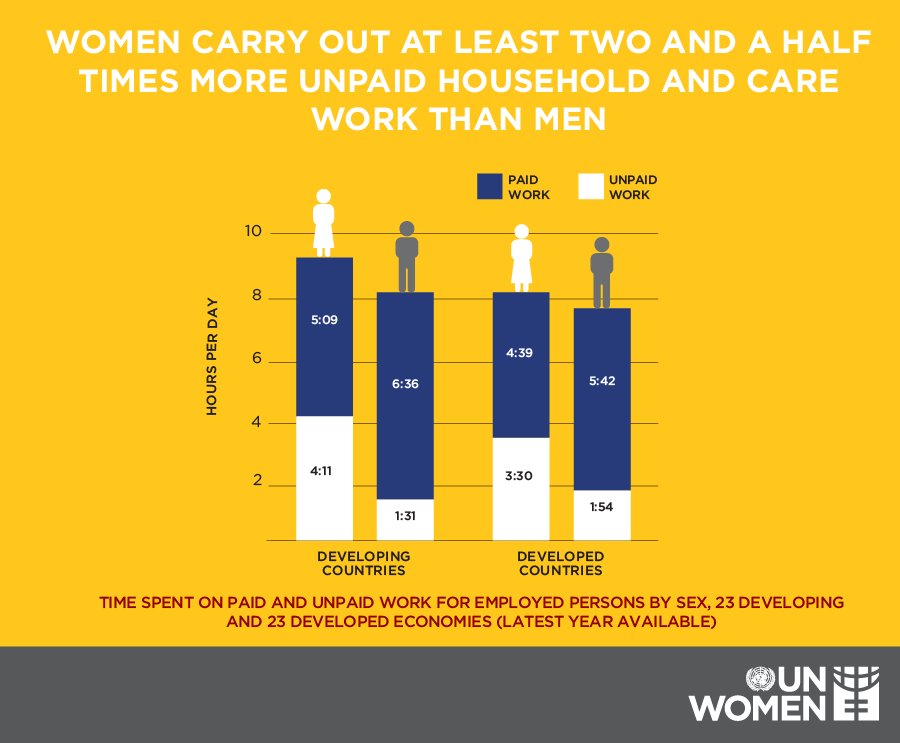 “What if we had an economy where human rights was the purpose of it. So recognize women’s unpaid work – find out what it contributes and put in structures to account for them.”
“What if we had an economy where human rights was the purpose of it. So recognize women’s unpaid work – find out what it contributes and put in structures to account for them.”
It is also revealing that about one third of the world’s 67 million women workers, cannot even exercise the basic right to join a trade union. Elizabeth Tang the General Secretary International Domestic Workers Federation says they are simply not recognized as workers in the legislation of many countries, including her home in Hong Kong.
On the practical level, given the acknowledged growth in inequality, that “very few women in poverty are speaking for themselves” according to Esther Mwaura the Executive Director of GROOTS. In Kenya, 80 percent of agricultural produce is produced by women’s labor. However, it is still seen as subsistence farming “financing is always micro when it is women’s work otherwise it is financing. In terms of infrastructure, health and education, which are all part of the feminization of poverty “there are things which can be done to avoid migration,” she says.
Professor Balakrishnan posed the question “how do we de-legitimize professional economics – which has the ear of government and is 90 percent male.” While there are good female economists – she added ruefully “I know all the feminists.”
The consultation day was just a mico look at the ongoing challenge to improve UN conventions, and the monitoring of the progress in them becoming central to national government policies which can ‘repurpose’ the world economy.
The CSW meets for its 61st year and it is no understatement to say that there is a long way to go.

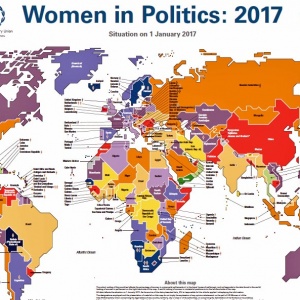
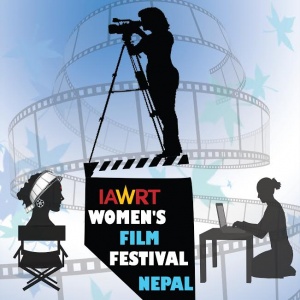
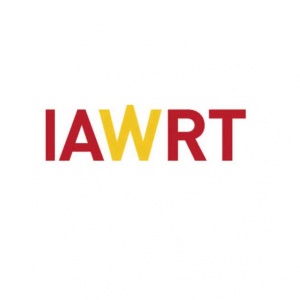
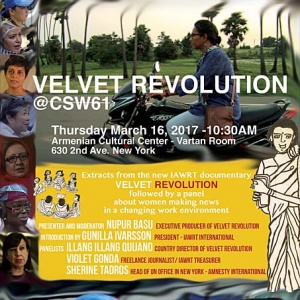
 Sherine Tadros, (pic left) the head of Amnesty International’s New York (UN) Office, a former Sky news and Al Jazeera journalist, reflected that the space for media to do uninhibited reporting was also contracting. “I was a Middle East Correspondent that could no longer get to report from the Middle East, I was always based in the Middle East, from Damascus to Lebanon to the Gaza strip to Egypt, but I found that increasingly, the space was getting smaller.”
Sherine Tadros, (pic left) the head of Amnesty International’s New York (UN) Office, a former Sky news and Al Jazeera journalist, reflected that the space for media to do uninhibited reporting was also contracting. “I was a Middle East Correspondent that could no longer get to report from the Middle East, I was always based in the Middle East, from Damascus to Lebanon to the Gaza strip to Egypt, but I found that increasingly, the space was getting smaller.”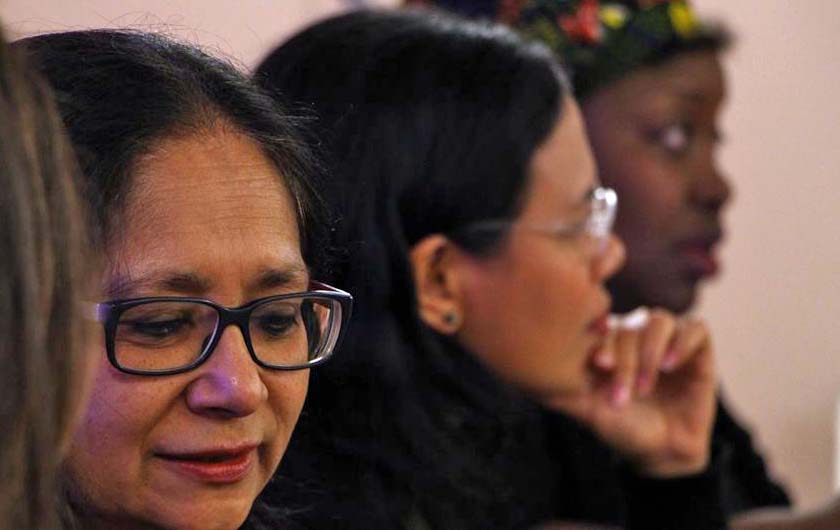 “It is even more dangerous now under the Durtarte administration. Now more than 7 thousand people, ‘drug suspects’ have been killed. I have interviewed some of the families – one of the children – her parents were shot in front of her – the younger sibling was even being hugged by her father when he was shot – just missed the kid by a few inches, so it is horrible.”
“It is even more dangerous now under the Durtarte administration. Now more than 7 thousand people, ‘drug suspects’ have been killed. I have interviewed some of the families – one of the children – her parents were shot in front of her – the younger sibling was even being hugged by her father when he was shot – just missed the kid by a few inches, so it is horrible.”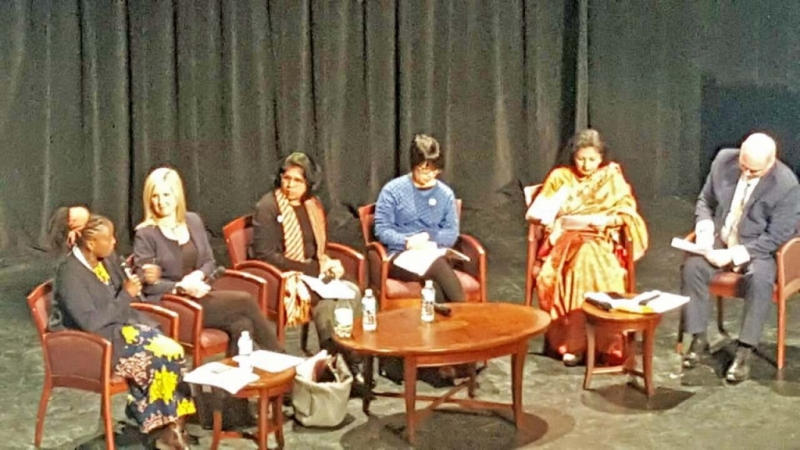
 Keynote speaker, Argentinean doctor and women’s activist, Dr Mabel Bianco, the 2017 Woman of Distinction awardee, also had a dire view – she expected the situation to get worse for women’s rights in the next year. “The struggle in Latin America and the Caribbean has had many advances … [but the] political contest worldwide is against human rights and specifically women’s rights”.
Keynote speaker, Argentinean doctor and women’s activist, Dr Mabel Bianco, the 2017 Woman of Distinction awardee, also had a dire view – she expected the situation to get worse for women’s rights in the next year. “The struggle in Latin America and the Caribbean has had many advances … [but the] political contest worldwide is against human rights and specifically women’s rights”. “What if we had an economy where human rights was the purpose of it. So recognize women’s unpaid work – find out what it contributes and put in structures to account for them.”
“What if we had an economy where human rights was the purpose of it. So recognize women’s unpaid work – find out what it contributes and put in structures to account for them.”